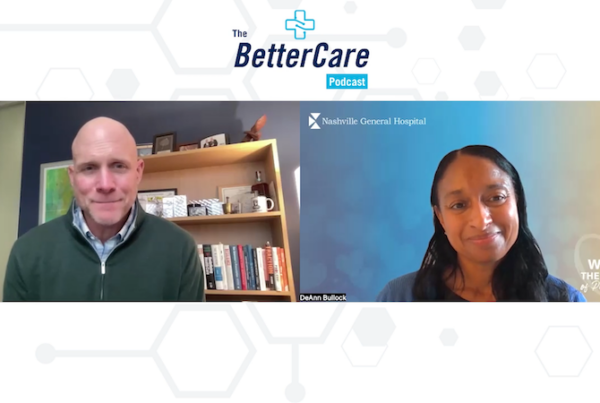As Medicare Advantage (MA) continues to grow, hospitals have faced growing challenges in navigating complex policies, payer friction, and financial pressures. Recently, I interviewed industry experts who discussed these issues in depth during a live recording of The Better Care Podcast.
The panel featured Jackie Kimmel, Senior Director of Strategy Catalyst for The Health Management Academy, Dr. Adam Fall, Corporate Medical Director of Utilization Management at Erlanger, and Dr. Jeny McNair, President and Chief Physician Advisor at Physician Advisory Services of Med-Metrix.
In this blog, we’ll explore the key takeaways from their conversation and offer actionable strategies hospitals can implement to address these challenges.
Some quotes have been slightly edited for brevity.
Ep 22 – Navigating Medicare Advantage Challenges for Hospitals – Live Panel
Medicare Advantage Growth and Policy Changes
The expansion of Medicare Advantage (MA) has reshaped healthcare dynamics. With 54% of Medicare beneficiaries now enrolled in MA plans and projections indicating this will increase to 62% by 2030, hospitals must prepare. With this growth, CMS will need to figure out how to pay for MA – according to research by The Health Management Academy, it is currently 5% of the federal budget.
CMS Policy Changes to Reduce Costs
Financial pressures are rising as CMS implements the updated Version 28 Hierarchical Condition Category (HCC) model, which introduces changes aimed at limiting types of codes that are most used for up-coding or over-coding to help rein in spending. The changes will also enhance the accuracy of coding and predictive analytics for patient conditions.
Notably, fewer ICD-10 codes qualify for mapping to HCCs, reflecting CMS’ focus to reduce the number of diagnoses that count towards risk adjustment. Newly added HCCs cover more specific conditions, removing redundant codes and adjusting groupings to align with actual patient risk.
These changes are significant because they directly target rising costs in Medicare Advantage. By reimbursing less for exaggerated or unnecessary diagnoses, CMS hopes to yield a reduction in MA risk scores resulting in billions in savings to the Medicare trust fund.
“Many of our health systems that have at-risk contracts are expecting headwinds in revenue of up to 20%.” – Jackie Kimmell
In addition to Version 28, MA plans must navigate a series of new regulatory shifts that affect their reimbursement. These include updates to the Star Ratings system, RADV (Risk Adjustment Data Validation) audits, the upcoming 2025 Final Rule containing the final rate announcements, and adjustments to prior authorization requirements.
For Star Ratings specifically, CMS spent $12.8 billion on bonus payments in 2023 for four- or five-star health plans – a 30% increase from the prior year. It’s going to get more difficult to achieve four or five stars in the future.
While some of these policy changes may seem minor on their own, collectively, they could further reduce profit margins for MA payers in addition to how much more they are spending related to the Medicare Two Midnight Rule changes. These changes will impact how hospitals approach their contracts and denial strategies.
Develop an Active MA Strategy
Hospitals should proactively assess their current Medicare Advantage strategies to address MA growth.
Kimmell noted that, “We’re seeing health systems trying to maintain the status quo or renegotiate contracts. However, many are choosing to exit some or all Medicare Advantage contracts, selecting preferred plan partners, working closely with payers to streamline the prior authorization and claims denial process, or even taking on risk themselves to remove payers from the equation entirely.”
Hospitals should evaluate whether maintaining or renegotiating MA contracts will ultimately support their long-term goals. Don’t forget you can always add an addendum to a longer-term contract.
Documentation Challenges and Payer Friction
As MA plans focus on profit margins, hospitals are encountering increased payer friction, denials, and administrative burdens, particularly around the CMS Two-Midnight Rule.
This rule, established by CMS, dictates that a patient’s hospital stay must be medically necessary and generally span at least two midnights to qualify for inpatient status (with some case-by-case exceptions), directly impacting reimbursement rates and audit risk. Under this rule, stays of fewer than two midnights are typically classified as outpatient or observation stays, which receive lower reimbursement rates.
However, MA plans are not required to follow the same presumption rules as traditional Medicare, meaning they can review stays of any length, leading to more frequent denials. These denials can disrupt hospital revenue cycles and increase costs due to increasing appeals. MA plans also hang their hats on use of criteria and sidestep physician judgement.
Streamline Documentation and Compliance Education
Educating clinicians and care teams on proper documentation for payer reviews is essential. Dr. Adam Fall emphasized the importance of capturing specific clinical details, sharing that,
“You have to write everything out specifically for each patient. As an example, you can’t just use a generic smart phrase for every heart failure patient. While a smart phrase might help you get started, you then must specify why this patient’s BNP is elevated, why this patient has bibasilar crackles, or why they’re requiring supplemental oxygen.
For example, if the patient needs IV diuretics at least twice a day, or if they need to be on telemetry and in the ICU, the details on “why” must be clearly documented.
All of these specifics indicate a reasonable expectation that the patient will require inpatient care for at least two midnights. So, when you put in that inpatient order, it implicitly means you believe the patient will need that level of care. Document why you believe that. There are support systems available, like EvidenceCare, to help streamline this process.” – Dr. Fall
Tailoring education around real case examples can empower staff to navigate payer requirements confidently.
Dr. Jeny McNair added that physicians do assessments in their head but fail to “think in ink.” She provides education to physicians to document their internal monologue.
“Every day, in every note, say why this patient can’t go home yet. Say what you’re looking for and what the risk of discharge is in every single progress note. MA plans are looking for contradictions in provider notes.
For example, if your patient isn’t supposed to be eating, why is there a diet order? If your patient is hypoxic, but you documented O2 saturation of 90% on 3 liters. That’s not hypoxic according to the criteria being used. It’s pivotal to explain that in your documentation.” – Dr. McNair
Prioritize Documentation over Attestations
Specific, detailed documentation remains a hospital’s strongest defense in appeals.
As Dr. McNair emphasized, “Any sort of scripted attestation means nothing… I need to see the medical necessity in your documentation.”
Hospitals should encourage clinicians to document each case uniquely, ensuring that clinical decisions are defensible in payer reviews and appeals.
Build Multidisciplinary Teams for Discharge Planning
Hospitals can streamline patient care by creating multidisciplinary teams focused on discharge efficiency.
Dr. McNair emphasized the value of collaborative discharge planning, noting that “a multidisciplinary approach… with social workers, care managers, and payer resources… can be instrumental in addressing social admits and complex discharges.”
In the face of operational inefficiencies and discharge delays, a collaborative approach that taps into payer resources and community support can make a significant difference.
Engage Payer Care Management Resources
Many health systems underutilize payer-provided care management resources, which can offer additional support for difficult cases.
Dr. McNair shared her insights from the payer side, stating that, “We had care managers and social workers to expedite discharges… but providers did not often take advantage of those resources.”
Encouraging care teams to leverage these services can help address delays and ensure compliance with payer policies.
Collect Data and Document Everything
In addressing CMS 4201 violations, it was recommended that hospitals focus on rigorous data collection and documentation. One approach recommended by Dr. McNair is to track each case meticulously and categorize them by payer to identify trends.
“We call them CMS 4201 violations. We document every single one. I highly recommend that every facility track and trend by payer and report this to the CMS regional offices. You must follow this case all the way through the appeals process before you report.” – Dr. McNair
With CMS now providing a centralized reporting inbox, organizations have a more streamlined way to report violations. Additionally, facilities should leverage Joint Operating Committees (JOCs) with their largest payers, using specific data on these violations to push for resolutions. This method has shown some progress in getting payers to address recurring issues.
As Dr. Fall noted, however, the process remains challenging.
“As far as the elevation process to CMS, it is cumbersome. It has to be one complaint or one filing at a time. Each one is password protected. You have to document and discuss with the payer what you did and try to remedy it. And then the payer has 30 days to come back to the person who submitted it. CMS is really just a facilitator. There are no teeth at this point in the process.” – Dr. Fall
Data-driven comparisons can help highlight discrepancies between different payers, but real change is more likely to come through contract negotiations. While CMS intended to simplify this reporting process, many find it has instead added to the administrative burden, emphasizing the need for a more streamlined approach to tackle these violations effectively.
To prepare for appeals, hospitals should maintain comprehensive records on payer denials and decision-making patterns. Dr. Fall highlighted the value of tracking data meticulously, noting, “if you’re documenting each case and tracking trends by payer… you can build a stronger case when you go to appeal.”
Send concerns or reports to https://www.cms.gov/medical-bill-rights/help/submit-a-complaint. Include detailed information about the violation, including the plan name, your contact information, and any supporting documentation. You can also file a complaint directly by calling 1-800-MEDICARE (1-800-633-4227).
AI Concerns and Contract Negotiations
The increased use of AI by payers to manage claims and denials presents ethical and practical concerns for hospitals. As contracts come up for renewal, hospitals should consider negotiating specific terms around AI use to ensure transparency and accountability.
Advocate for Specific and Shorter Contract Terms
Kimmell suggested negotiating shorter contract durations to enable hospitals to revisit terms in response to AI developments and regulatory shifts.
“I think there’s a significant opportunity to make contracts shorter, especially in this age of AI. Rather than signing multi-year contracts, we can aim for one- to two-year contracts, allowing us to renegotiate terms if payers start to substantially deviate from market norms or introduce new tools like AI. This flexibility makes it much easier to adjust as conditions change.” – Kimmell
If you happen to be in a contract that has a significant amount of time left, consider pursuing an addendum.
Demand Transparency on AI in Claims Management
Given the lack of transparency around AI use in payer decisions, hospitals should advocate for clear language in contracts that requires payers to disclose AI applications in claims processing. Dr. McNair reinforced this idea, sharing that, “The CMS4201 memo very clearly states [payers] cannot just use AI alone for denial decisions.”
Hospitals should set expectations for payers to provide transparent AI protocols and conduct manual reviews for complex cases.
Other Contract Terms to Consider
A few other things to consider in your contracts:
-
- Require advance notice of any provider manual updates that may change terms in your contract (e.g., readmission timeframes)
- Put more granularity around the 4201 requirements
- Allow for appeal before a plan can recoup money.
Lastly, often when payers deny for avoidable days, it is because they have not approved a post-acute level of care. A way to mitigate this is to put into contracts that if they are the cause of the delay in discharge, that they should pay x percent per day.
Chevron Ruling and Medical Necessity Appeals
The recent Chevron ruling, which removes the judicial deference traditionally given to agency interpretations in legal cases, could also significantly impact medical necessity appeals. Previously, courts often deferred to agencies like CMS for interpreting ambiguous regulations. Now, without this deference, courts may interpret regulations more independently, which could complicate appeals processes for hospitals.
For hospitals, this shift means that agency guidelines, such as CMS’ guidance on medical necessity, may no longer carry the same weight in appeals. Hospitals may face a new layer of complexity in defending clinical decisions, as courts could potentially reinterpret these guidelines or question their applicability.
This change increases the burden on hospitals to present stronger, more detailed evidence supporting their medical necessity decisions, as reliance on CMS standards alone may no longer suffice. Medicare Advantage plans, already under scrutiny for high denial rates, could face a higher risk of overturned denials through appeals. Hospitals may find it easier to challenge denials based on legal interpretation rather than agency-defined standards.
Overall Action Plan:
To thrive in the era of Medicare Advantage expansion, healthcare leaders should consider the following strategies:
-
- Develop an active MA strategy, assessing current contracts and considering partnerships that align with long-term goals.
- Prioritize physician education on proper documentation and payer requirements to minimize administrative burdens and ensure appropriate reimbursements. Physicians must learn to be specific and capture the “why” for patient admissions and the risk of discharge. “Think in ink.”
- Collect data on Medicare Advantage plan behavior, report violations to CMS, and engage in regular joint operating committee meetings with payers.
- Report 4201 violations when appropriate.
- Advocate for shorter contract terms and clear provisions regarding the use of AI in claim denials during contract negotiations.
- Foster collaboration among various departments and leverage payer resources to support patient care and discharge planning.
- Monitor the impact of the Chevron ruling on medical necessity determinations and appeals, adapting strategies as needed.
The expansion of Medicare Advantage presents both challenges and opportunities for hospitals. By staying informed, prioritizing proper documentation, engaging with payers, adopting a multidisciplinary approach, and monitoring legal developments, healthcare organizations can successfully navigate the complexities of Medicare Advantage.
“A proactive Medicare Advantage strategy is more vital than ever.” – Jackie Kimmell
To watch or listen to the full episode, check out Episode 22 of The Better Care Podcast.










